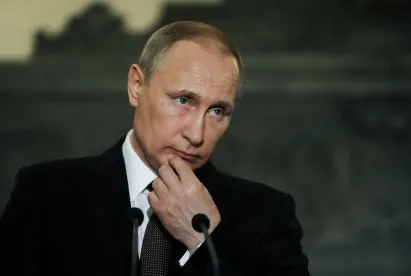Since the U.S. Government determined that Russia interfered in the 2016 election[1], movement around Russia sanctions policy has been vigorous, if not unidirectional. In 2016, the United States implemented twice sanctions against Russia: In September, dozens of individuals and entities were sanctioned with regards to Russian operations in Crimea. In December, President Obama expelled 35 Russian intelligence agents from the U.S. and imposed sanctions on two major intelligence services, as a response to those interferences from Russia. In 2017, concerned that the new Administration might roll back certain sanctions on Russia, Congress overwhelmingly passed the Countering America’s Adversaries Through Sanctions Act, codifying and adding to sanctions on Russia already in place (which we reported on here).
In January, we anticipated two more moves mandated under CAATSA: 1) the publication of a List of Senior Political Figures and Oligarchs in the Russian Federation and 2) sanctions against entities and individuals that had conducted significant transactions with the defense and intelligence sectors in Russia. It appears that one was a feint and the other, a flop.
The Oligarchs List
The anticipation of the release of the Oligarchs List (or, in its more Tom Clancyesque appellation, “The Kremlin Report”) reportedly had much of the Russian elite nervous. Some reportedly made efforts not to be seen in the company of senior Russian officials, others sent lobbyists to Washington to try to influence their way off of the list. Interestingly, the list by itself had no legal effect. It did not implement sanctions against the listed persons (though 22 of the listed persons were already under sanction) nor otherwise restrict doing business with those persons. However, before its release, no one was eager to be on it.
What happened next was a little baffling. The list that was published, at least the unclassified version, was a copy-paste of lists posted on the English language sites of the Kremlin, the Russian government, and the Russian Forbes’ billionaires list. The list cut off at number 96, exactly where the Forbes estimates of personal wealth went below 1 billion. The list includes people who are in disputes with the Government over its efforts to take property from them, and excludes people with well-known Kremlin connections or who own the media outlets that are Putin’s propaganda arm.
Although the list does not demonstrate that it was supported by great consideration or study, the gesture may still have an effect. Bloomberg reports that The Financial Integrity Network, consultants on illicit finance threats, have advised treating those listed as “politically exposed persons” a red flag for involvement in corruption. Additionally, Steve Mnuchin has stated that “there will be sanctions that come out of this report,” indicating that the Office of Foreign Assets Control may still take action. However, given the anemic effort that went into the report, and the unwillingness to implement further sanctions (on which more anon), that statement may also turn out to be a feint.
The Next Round of Sanctions (or Lack Thereof)
Last Monday, the sanctions expert community also expected the Administration to announce sanctions on individuals and entities for conduct related to Russia’s defense and intelligence industries. Section 231 of CAATSA requires that the President impose sanctions on persons that the U.S. government determines knowingly engaged in significant transactions with Russia’s defense or intelligence sectors. CAATSA required that those sanctions be imposed on or after January 29, 2018. On October 27, 2017, the State Department published a list of persons that the State Department determined to be part of the Russian defense and intelligence sectors, presumably to put people on notice of who they should steer clear of when doing business in Russia.
On January 29, the State Department announced that no sanctions would be imposed under Section 231 because the “legislation and its implementation are deterring Russian defense sales.” According to the State Department, “foreign governments have abandoned planned or announced purchases of several billion dollars in Russian defense acquisitions.” In a briefing, a State Department official described the result as “real success, it’s real money, and it’s real revenue that is not going to the Kremlin and is not going to Russia…to remind Russia and remind the Russian Government of the costs of its malign activity…”
But some lawmakers perceive the lack of sanctions as letting Russia off the hook. Representative Maxine Waters, who is the ranking Democrat on the House Financial Services Committee, stated that she finds it “preposterous that…the legislation has served as such a deterrent that not one person or entity is engaged in a significant transaction with the Russian defense or intelligence sectors.”
Let’s think about what makes sanctions policy effective and thus, successful. The U.S. government uses many foreign policy tools to either incent, deter, or punish behavior of other nations. The government does so to affect a change in behavior by another state using economic, rather than military force. CAATSA was enacted to punish Russia for its 2016 election meddling but also todeter Russia from meddling in future elections. Therefore, in theory, hitting Russia economically should result in deterring Russia from future bad behavior.
The State Department appears to take the position that if the legislation is preventing defense sales, then the U.S. has achieved the objectives of the law. However, while certain business may have been deterred from selling defense products to Russia (which we have to take the government’s word for because there is no public information as to whether “billions of dollars” in sales have been abandoned), nothing in current Russian sanctions policy, or in intelligence reports, suggests that current U.S. sanctions are deterring Russia from interfering in future U.S. elections. Mike Pompeo, the Director of the CIA, stated that he has not seen “a significant decrease in [Russia’s] activity” and that he has “every expectation that they will continue to try” to interfere in U.S. elections. Of course, it remains to be seen whether choosing not to impose further sanctions will embolden Russia in its election interference, which would be seen as a distinct flop.
The Takeaway
Current sanctions appear not to deter Russian bad behavior and the Oligarchs List appears to have been cribbed from someone else’s homework. Taking the two together, one begins to suspect that the Administration, without a further push from Congress or world events, will continue to resist ratcheting up Russia sanctions. That sort of prediction may not be certain enough to bet the company on, but with careful counseling, companies may consider continuing their lawful business in Russia without concern that it will soon be subject to sanction.
[1] On January 6, 2017, the U.S. Intelligence Community issued a report “Assessing Russian Activities and Intentions in Recent US Elections,” and concluded with high confidence that President Putin ordered an influence campaign in 2016 aimed at the US presidential election.




 />i
/>i
